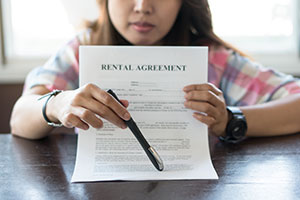COVID 19 – a residential landlord's perspective by Jason Hobday, Associate, and Nigel Emmerson, Partner, at law firm Womble Bond Dickinson
We find ourselves in unprecedented times for the modern era. In this every changing environment, with an overload of government guidance, and which is changing on a daily basis, residential landlords are eager to understand what obligations they may have towards their tenants. Whilst many landlords will be motivated by a laudable desire to act in the best interests of their tenants, care should be taken to ensure that they do not inadvertently find themselves on the wrong side of the law.
As at the time of writing landlords are not under any direct statutory duties in relation to taking steps to support the government's strategy for dealing with COVID-19 – which has now reached phase 2 – 'delaying the spread of the virus'. This may however change in the coming days and weeks and so the position should be closely monitored using the Public Health England guidance https://www.gov.uk/government/topical-events/coronavirus-covid-19-uk-government-response
Notwithstanding that landlords are not under any direct statutory duty in respect of COVID-19 at present, they may however be subject to other legal duties requiring them to implement appropriate measures to protect tenants and the wider public. For example, The Management of Health and Safety at Work Regulations 1999 imposes an obligation on a landlord to carry out a risk assessment of communal areas in blocks of flats; and where there is an existing health and safety risk assessment in place, to review this if there is any reason to suspect that it is no longer valid or there has been a significant change in the matters to which it relates. The risk assessment must be recorded if the business has more than five employees. It is submitted that the outbreak of COVID-19 would be a material risk and a significant change that would trigger the need for an existing health and safety risk assessments to be reviewed and reasonable measures implemented to reduce the risk to employees, contractors and others that use such areas – namely residents and visitors.
What reasonable measures a landlord should take will depend on the nature of the communal areas and facilities. Regard should of course be had to Public Health England and government guidance in determining what are reasonable measures. The Prime Minister's announcement on 16 March 2020 - generally aimed at encouraging greater social distancing, may therefore lead operators of Build to Rent and apartment blocks with cinemas, restaurants, sporting and social facilities for the benefit of residents, to consider that a reasonable measure may be to close such facilities for the time being. Given the continued escalation of the virus, and the government's guidance on social distancing, it would seem eminently sensible for landlords to consider implementing such a measure. As such guidance is advisory at this stage rather than mandatory, and therefore the landlord is not compelled to close communal facilities, we would recommend that before jumping into such decisions landlords may wish to consider quickly, but carefully, checking contracts/leases to determine whether closing such facilities would result in them being in breach of contract/lease (and therefore liable for failure to perform their contractual obligations); and if so, whether the contract/lease contains a force majeure provision enabling the landlord to cease the performance of those specific obligations. Force majeure clauses are notoriously tricky, often with forensically selected wording, and so it may be sensible for landlords to seek legal advice on whether their decision would fit within the force majeure provision, rather than simply assuming that because there is such a provision everything will be fine. It may not cover COVID-19.
Where the contract does not include a force majeure provision the landlord may as an  alternative have recourse to the common law rule of frustration – which may release a party to a contract from an obligation if circumstances would render the performance of the obligation impossible or radically different. The circumstances where the doctrine of frustration would apply are however very narrow, and so legal advice should be sought.
alternative have recourse to the common law rule of frustration – which may release a party to a contract from an obligation if circumstances would render the performance of the obligation impossible or radically different. The circumstances where the doctrine of frustration would apply are however very narrow, and so legal advice should be sought.
In respect of other measures, many landlords are already undertaking extra cleaning of communal areas based upon Public Health England guidance for 'health professionals, businesses, schools and other organisations’ updated as at 12 March 2020. Guideline 4 is to ‘Clean and disinfect regularly touched objects and surfaces using your regular cleaning products to reduce the risk of passing the infection on to other people.’ Whilst costs of extra cleaning will almost certainly be recoverable from tenants via the service charge, landlords should remember that for costs to be recoverable they must have been reasonably incurred. Where they are not reasonably incurred they will not be recoverable via the service charge. A careful balance should therefore be made as to how far to go with the extra cleaning. Engaging the services of a specialist cleaning company to do a daily deep clean of all communal areas using expensive chemicals and processes may be challenged at a later stage by a tenant (once they receive their service charge demand) on the basis the Public Health England guidance did not suggest such excessive measures would be necessary. Ensuring any additional services are in line with the guidance of the day will reduce the likelihood of a tenant successfully challenging the costs.
Landlords may also perhaps wish to consider taking this opportunity to review their service costs base with a view to identifying areas where they could temporarily cut back on some non-essential cost items or services if more extreme measures have to be implemented over the coming weeks and months.
Landlords may also consider the collection from residents and visitors of data on recent travel to high risk countries, or whether they are experiencing symptoms of COVID-19, to be reasonable measures. If such information were however to be used to support the exclusion of residents and visitors from their property landlords may find themselves in breach of the covenant for quiet enjoyment or non-derogation from grant. A reasonable middle ground may instead be to ask tenants to follow the guidance on how to respond in the event they suspect they have caught the virus – namely to self-isolate until they receive their test results. Suspected cases in employees should be removed from the workplace and relocated to a separate location or office in order to seek further advice from NHS 111. Current guidance confirms there is no requirement to close the workplace. If there is a confirmed case of COVID-19 with an employee or a resident within the block, the Public Health England local health protection team will contact the landlord or managing agent in order to carry out a risk assessment and advise on any actions that should be taken in respect of isolation, cleaning and waste disposal.
What about alerting other residents and staff where there are suspected or confirmed cases of COVID-19 in the staff employed at or amongst other residents in the block? The Information Commissioner's Office (ICO) has confirmed that other people that may potentially be affected should be informed about cases, however the ICO caveats this by confirming that this can be done without naming individuals – which would of course almost certainly amount to a breach of GDPR/data protection. Landlords wishing to encourage greater vigilance amongst residents, visitors and staff, by putting them on notice of suspected or confirmed cases, should therefore avoid including in any communication any information that may identify the affected individuals - such as their names, job role, flat number or the floor their flat is located on.
In addition to taking practical steps to reduce the risks, and monitoring developing guidance, landlords should look out for the introduction of emergency legislation for dealing with the outbreak. Of relevance to all landlords may be the introduction of protection for renters falling in to arrears as a result of COVID-19. The current draft of the Landlord and Tenant (Temporary Provision) Bill 2020 (which has not, as at the time of writing, even been placed before Parliament) would apply to Rent Act tenancies, secure tenancies and assured tenancies (including assured shortholds). The protection would operate such that if the tenant was unable to pay any rent falling due between 1 March 2020 and 1 September 2020 as a result of the effects of the Coronavirus disease, that rent falling due within that period would not be treated as being lawfully due for the purposes of the relevant rent arrears grounds applying to that tenancy type. Contractually the rent would still be owed to the landlord by the tenant, however the landlord would simply not be able to rely upon those arrears for the purposes of the possession claim. For the purposes of private rented sector tenancies this will therefore apply to case 1 of the Rent Act 1977, and to grounds 8, 10 and 11 of the Housing Act 1988. As currently drafted the bill does not apply to the use of a section 21 notice where the basis for the service of the notice is rent arrears. Given the vast majority of renters in the private rented sector would therefore remain at risk from a possession claim via section 21 if they fell in to arrears due to COVID-19 it remains to be seen whether the government may also try to extend the protection to place an embargo on section 21 notices. Quite how this could be achieved is unclear however as section 21 does not require the landlord to identify the reason for the service of the section 21 notice. [1]
- Log in to post comments














